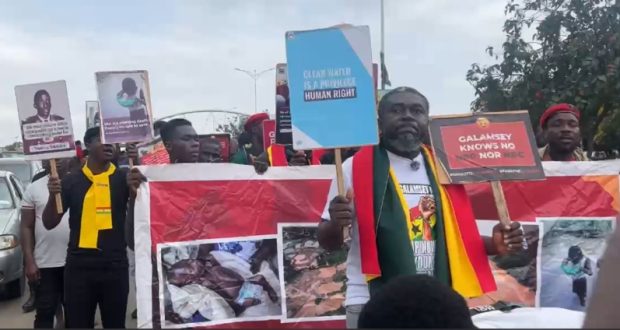By nfm
Copyright naagyeifmonline

Under the hashtag #StopGalamseyNow, a fresh round of demonstrations has swept the city as people call for immediate action to stop the destructive impacts of illegal mining (galamsey).
The Democracy Hub is leading the demonstrations, which are intended to put pressure on the government to stop the severe environmental harm and socioeconomic difficulties brought on by the illegal activities.
After a vigil was held at Accra’s Revolution Square the night before, the protests are in their second day.
Beginning at the Accra Mall, the protest march was scheduled to conclude at the Jubilee House with the petition being presented to President John Mahama.
The demonstrators deliberately went extremely slowly along the main streets to the government seat, according to Kwaku Asante of JoyNew.
Oliver Barker-Vormawor, the Convenor of the #FixTheCountry movement, announced the rally and clarified that the march was meant to raise awareness to the damage that Galamsey has made to Ghana’s ecology and water bodies.
The growing problem of illicit mining, which has severely damaged Ghana’s economy and environment, is the direct cause of the protests.
About 60% of Ghana’s water bodies are currently contaminated, according to the Water Resources Commission.
Millions of Ghanaians rely on major rivers like the Pra, Ankobra, Birim, and Offin for irrigation and drinking water, however these rivers are severely tainted with harmful substances including arsenic, cyanide, and mercury.
The Ghana Water Company Limited (GWCL) has expressed concern over its current abnormally high chemical expenditures and skyrocketing operating expenses.
In September 2025, GWCL suggested raising water rates by 280%, citing Galamsey as the cause of the increase.
According to the Wilson Centre, unlawful smuggling and lost revenue from galamsey cost Ghana around $2.3 billion annually.
About 35% of Ghana’s gold production comes from legal small-scale mining, while illicit activities deplete funds and harm other important industries.
Large areas of cropland have been damaged by Galamsey, endangering Ghana’s food supply.
Reduced crop yields have also resulted from the destruction of farms and forests; in 2022, cassava yields in the Amansie West district fell by 40%.
The cocoa sector, which contributes to about 10% of Ghana’s exports, has been impacted by the destruction of more than 100,000 acres of cocoa farms.
Reduced crop yields have also resulted from the destruction of farms and forests; in 2022, cassava yields in the Amansie West district fell by 40%.
Toxic chemical use has been connected to serious health problems like cancer, birth abnormalities, and kidney failure.
In addition to the health and environmental problems, galamsey has grown more violent; according to a Human Rights Watch investigation, battles with armed galamsey gangs have killed a number of people and security officers.
A coordinated and decisive effort to halt what they call “ecocide” has been demanded by organisations like WaterAid Ghana and the Coalition of NGOs in Water and Sanitation (CONIWAS).
They have advocated for a comprehensive strategy that includes public health campaigns to inform people about the risks of contaminated water, alternative livelihood opportunities, and rigorous legal enforcement.